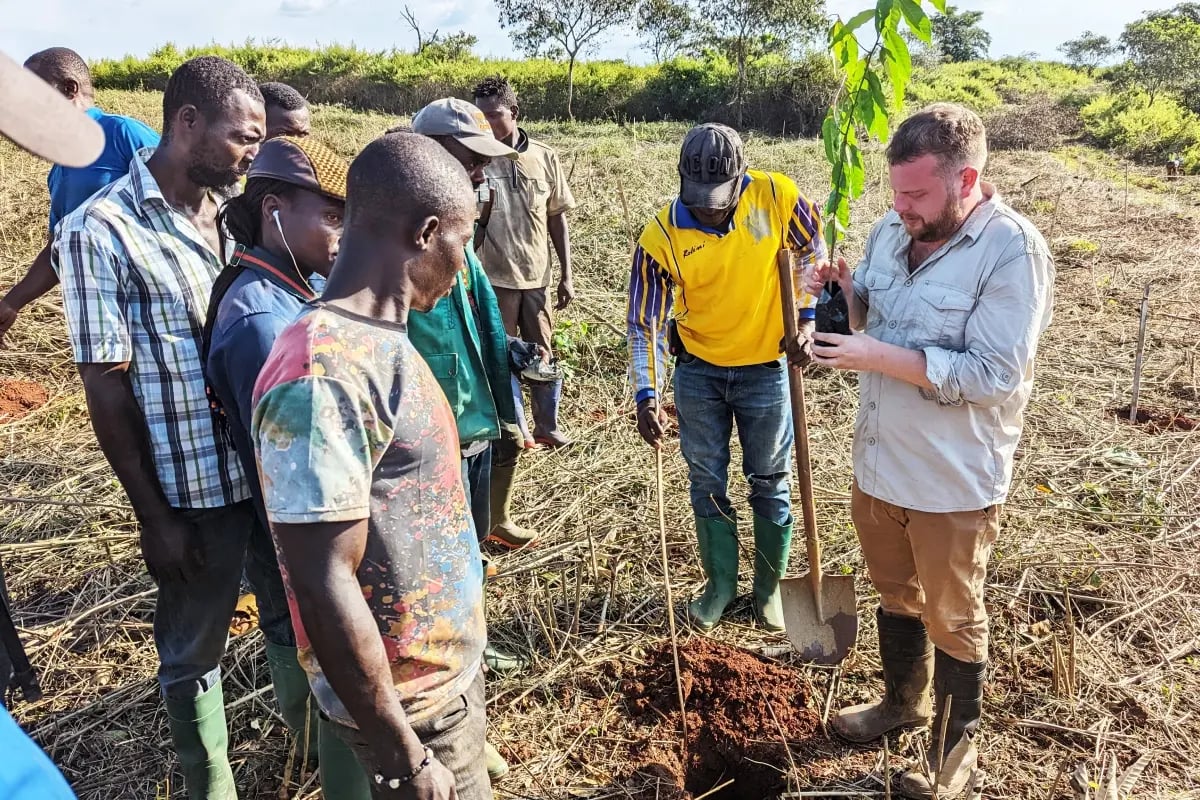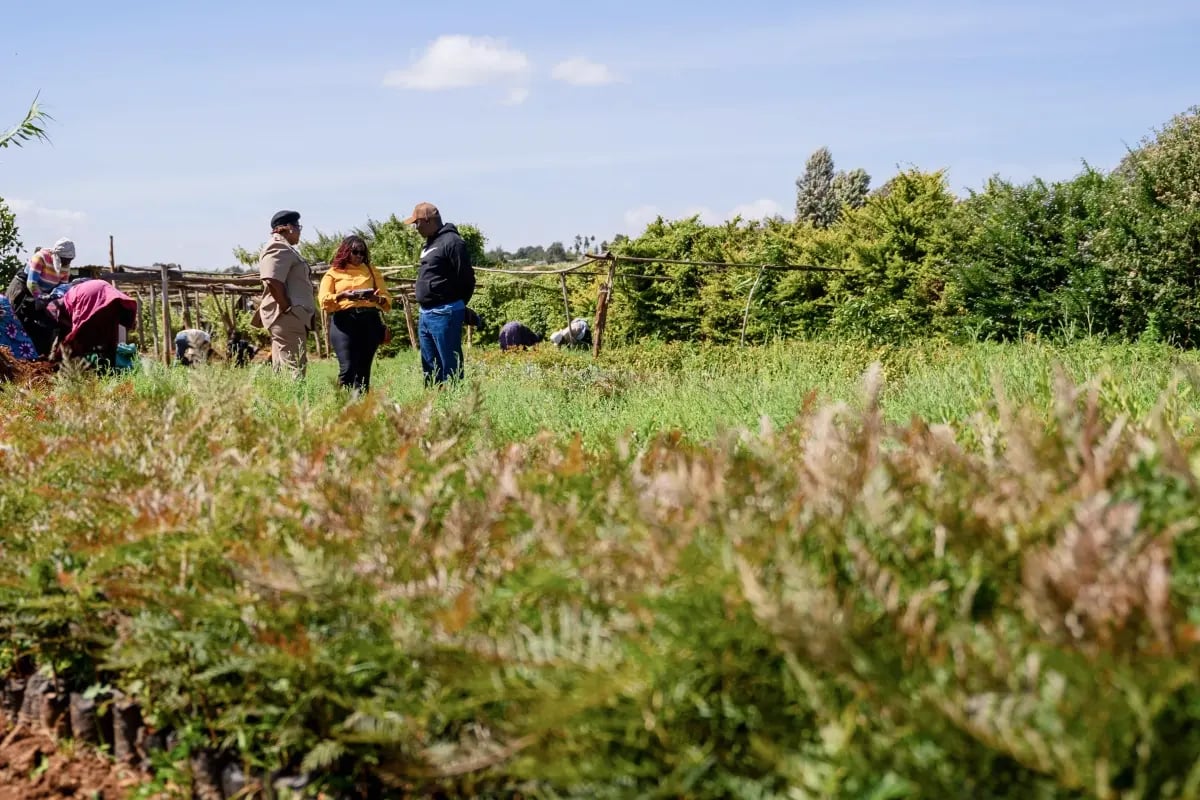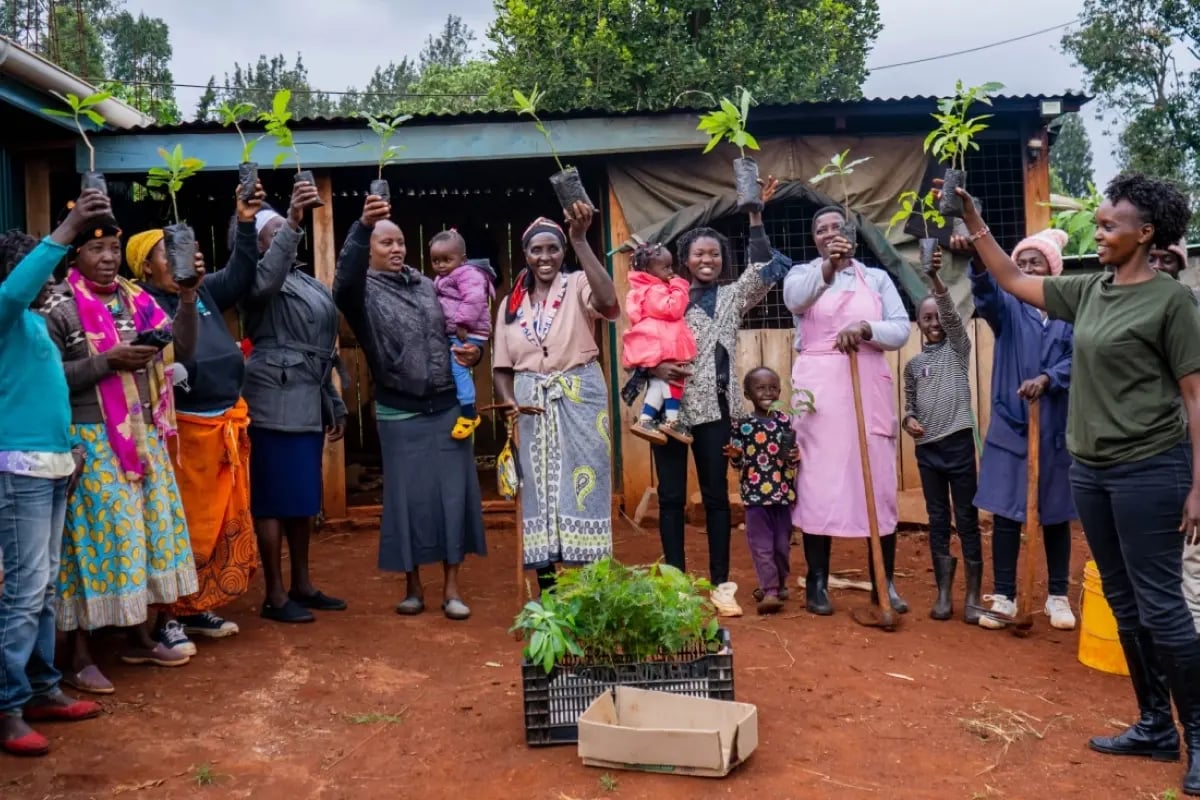At Green Earth, our nature-based projects don’t just restore ecosystems—they create opportunity, income streams, and improved livelihoods for local communities. From Uganda to Cameroon and Kenya, our projects bring tangible, life-changing benefits to the people who live in and around the landscapes we’re restoring. Here’s a closer look at how our work is making a difference on the ground.
 A woman from the local community inspecting an avocado tree in the orchard. Hongera Reforestation Project, Green Earth.
A woman from the local community inspecting an avocado tree in the orchard. Hongera Reforestation Project, Green Earth.
Bulindi Agroforestry and Chimpanzee Conservation Project (Uganda)
In the heart of western Uganda, the Bulindi Agroforestry and Chimpanzee Conservation Project is protecting a vital population of endangered chimpanzees while simultaneously transforming the lives of the surrounding communities. The project is built around a pioneering revenue-sharing model: all agricultural revenues go directly to the Bulindi Chimpanzee and Community Project (BCCP), our local NGO partner that supports both conservation and community development as outlined below.
 Green Earth team members at a tree nursery in Uganda. Bulindi Agroforestry and Chimpanzee Conservation Project, Green Earth.
Green Earth team members at a tree nursery in Uganda. Bulindi Agroforestry and Chimpanzee Conservation Project, Green Earth.
With this funding, communities are already experiencing vital improvements:
- Access to clean water: New boreholes are being developed in villages where water scarcity was a daily challenge, improving health and reducing time spent collecting water.
- Reduced human-wildlife conflict: Targeted initiatives, such as community outreach and habitat buffering, are helping ease tensions between people and chimpanzees, protecting both lives and crops.
- Wildlife education for children: Local schools now benefit from dedicated programmes that teach children about chimpanzee conservation and biodiversity, building a new generation of environmental stewards.
Read more: Seeds of impact: Expanding Uganda’s green horizon
Meanwhile, the project is strengthening the local economy in several impactful ways:
- Sustainable farming training: Farmers receive hands-on guidance in regenerative practices that boost productivity while protecting soil health and biodiversity.
- Fair market access: Community members selling their agricultural produce to Green Earth earn profit above the local (farm gate) market price, offering them a more reliable and rewarding income stream.
- Job creation across the value chain: Employment opportunities have expanded in nurseries, fieldwork, chimpanzee monitoring, agronomy, administration, and finance—providing stable livelihoods in a region where work is often seasonal or informal.
- Support for conservation science: The project facilitates academic research into chimpanzee behaviour, led by primatologist Dr Matt McLennan, contributing valuable data to global efforts in great ape conservation.
Read more: From the ground up to space: seeing Green Earth’s impact in Uganda
Greenzone Reforestation Project (Cameroon)
The Greenzone Reforestation Project in Cameroon’s Central Region is turning degraded land into vibrant forest landscapes while opening up entirely new pathways for local development. The project allocates all agricultural revenues, and part of the income from value-added agricultural activities, such as turning harvested mangoes into juice, into a Community Fund. This fund is already delivering transformational results.
 A Green Earth team member conducting a tree planting training in Cameroon. Greenzone Reforestation Project, Green Earth.
A Green Earth team member conducting a tree planting training in Cameroon. Greenzone Reforestation Project, Green Earth.
The Greenzone project is already transforming daily life for local communities:
- Improved infrastructure and mobility: A newly constructed road funded by the Community Fund now links the nursery village to the main highway, ending seasonal isolation caused by flooding and enabling reliable year-round transportation. This connection has opened up access to markets, schools, and essential supplies.
- Economic inclusion: With better access, residents can trade goods more easily, attract new business opportunities, and participate in the regional economy—something that was nearly impossible during rainy seasons.
- Access to healthcare services: For the first time, local communities receive weekly visits from medical specialists at the project site. These regular clinics provide essential health services, including checkups and treatment, to people who previously had no professional care available.
- Improved health outcomes: Consistent access to medical support is already making a visible difference in community wellbeing, from maternal health to basic disease prevention.
Read more: Greenzone Reforestation Project: big steps in Cameroon
- Agronomy training and knowledge transfer: Farmers receive practical training in modern, sustainable agricultural techniques—focusing on soil health, crop rotation, organic inputs, and water conservation—to improve productivity without compromising the environment.
- Stable rural employment: The project provides long-term jobs in nurseries, field operations, and administrative roles, offering consistent income in areas where economic opportunities are often scarce or seasonal. These roles also build local capacity and foster stewardship of the restored landscapes.
This combination of environmental and social action is creating a blueprint for what truly inclusive reforestation can look like.
Hongera Reforestation Project (Kenya)
Our Hongera Reforestation Project in Kenya takes its name from the Swahili word for celebration—a fitting tribute to the success it has already brought to both people and nature. Like our other projects, Hongera channels all agricultural revenues and a part of total project revenues into a Community Fund, which then supports a wide range of community development initiatives.
 Local community members and the Green Earth team working together at a tree nursery in Kenya. Hongera Reforestation Project, Green Earth.
Local community members and the Green Earth team working together at a tree nursery in Kenya. Hongera Reforestation Project, Green Earth.
The Hongera project and its Community Fund are delivering tangible benefits that support both household wellbeing and environmental restoration:
- Access to energy-efficient cookstoves: Households receive Hongera cookstoves, significantly reducing the need for firewood. This not only lowers household fuel costs but also helps reduce deforestation in surrounding areas.
- Healthier indoor environments: By replacing traditional open fires, the fuel-efficient stoves improve air quality inside homes, reducing respiratory issues and other health risks—especially for women and children.
- Alternative income through beekeeping: Families gain access to the Kenya Beehives Project, which equips them with hives and basic apiculture training, enabling honey production and sales as an additional source of income.
- Boosting biodiversity through pollination: The beekeeping initiative also strengthens local ecosystems by increasing pollination activity, which supports healthier crops and native plant life.
Read more: A firsthand look at our impact in Kenya
The project also plays a key role in strengthening long-term community resilience:
- Comprehensive training programmes: Community members benefit from training not only in sustainable farming techniques but also in household finance and hygiene. These sessions equip families with practical skills to manage resources more effectively, improve daily living conditions, and support long-term wellbeing.
- Job creation linked to restoration work: The project provides consistent employment in nurseries, field teams, and support roles. These jobs not only offer stable income but also actively involve local people in restoring and maintaining their natural environment.
- Early signs of success through harvests: Trees planted in 2022 are already bearing fruit, including avocados. These first harvests represent more than agricultural success—they mark the beginning of a sustainable, regenerative economy rooted in community care and environmental stewardship.
Read more: The power of Green Earth's high-quality carbon projects in Kenya
A model for regenerative change
The most profound social impacts of our projects often come after the sale of carbon credits, when revenues flow into Community Funds and begin unlocking new infrastructure, services, and opportunities. This cycle of investment and reinvestment is what makes Green Earth’s approach to nature-based solutions truly regenerative.
We don’t just plant trees. We help build local economies. We don’t just offset emissions. We create access to water, healthcare, education, and markets. Every tree planted through a Green Earth project is part of a larger ecosystem of support, where people and nature thrive together.
 A Green Earth team member and local community members during the distribution of tree seedlings in Kenya. Hongera Reforestation Project, Green Earth.
A Green Earth team member and local community members during the distribution of tree seedlings in Kenya. Hongera Reforestation Project, Green Earth.
This is the future we’re building, and you can be part of it. Whether you’re an investor looking to fund sustainable impact, a business leader seeking high-integrity carbon credits, or someone passionate about planting trees and restoring the balance between people and the planet, we invite you to join us. Together, we can grow more than forests—we can grow futures.






